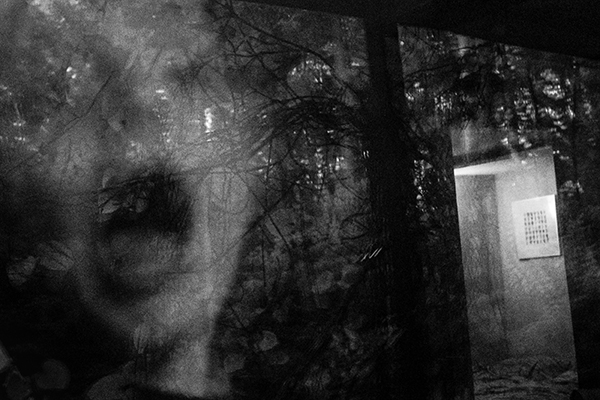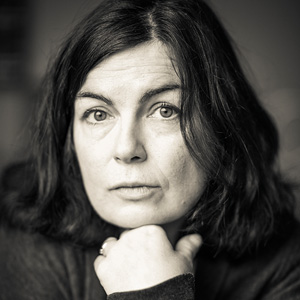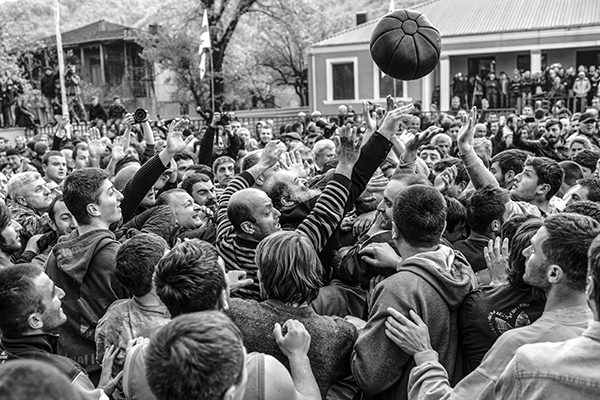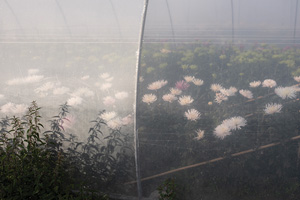Part 2 Polish Women Photographers: Documentary "Obsession of reality"
 © Agnieszka Maruszczyk
© Agnieszka Maruszczyk
Documentary Work
Polish | English
Rzeczywistość w polskim dokumencie kobiet fotografek
nie jest łatwa, nie jest cukierkowa i nie przypomina
życia hollywoodzkich gwiazd. Czasami jest brutalna,
trudna ale na pewno jest prawdziwa.
Współczesna fotografia dokumentalna polskich fotografek przybiera rozmaite formy i nie trzyma się jednych, sztywno wyznaczonych standardów. Oglądając ich projekty dokumentalne, odnosi się bardzo często wrażenie, że polskie fotografki nie skupiają się jedynie na tematach nośnych, newsowych, budzących jedynie sensację w mediach. Nie jest ich głównym celem, epatowanie obrazami pełnymi bestialskiej śmierci i wojennych tragedii. Nie znaczy to, że takie tematy nie są dla nich ważne.
 Wręcz odwrotnie. Ludzkie cierpienie, głód, wojna i agonia planety, na której żyjemy to niezwykle istotne problemy. Jednak, być może dzięki swojej kobiecej intuicji, fotografki doskonale wiedzą gdzie jest początek tych wszystkich nieszczęść. Bo przecież świat jest całkiem w porządku. To tylko z ludźmi dzieje się ostatnio coś niedobrego. I ma się nieodparte wrażenie jakbyśmy pogubili się w tym świecie. Przepełnieni żądzą posiadania i władzy, zapominamy o najprostszych wartościach w ludzkim życiu.
Wręcz odwrotnie. Ludzkie cierpienie, głód, wojna i agonia planety, na której żyjemy to niezwykle istotne problemy. Jednak, być może dzięki swojej kobiecej intuicji, fotografki doskonale wiedzą gdzie jest początek tych wszystkich nieszczęść. Bo przecież świat jest całkiem w porządku. To tylko z ludźmi dzieje się ostatnio coś niedobrego. I ma się nieodparte wrażenie jakbyśmy pogubili się w tym świecie. Przepełnieni żądzą posiadania i władzy, zapominamy o najprostszych wartościach w ludzkim życiu.
Polskie fotografki, dzięki swojej wrażliwość i ogromnym pokładom empatii, próbują zwrócić naszą uwagę właśnie na te pogubione wartości. Poprzez swoją czułość ale jednocześnie również i ciekawość świata, powodują, że na ich zdjęciach możemy oglądać znacznie więcej niż udaje się nam dostrzec na co dzień. Ich uważność i wyostrzona intuicja, dotyka w swoich fotografiach – na pozór tematów niezwykle prostych. Jednak kiedy zaczniemy się temu przyglądać z większą uwagą, to będziemy mogli odczytać złożoność tych opowieści. (image ©Magdalena Wdowicz - Wierzbowska)
Dzięki fotografiom polskich dokumentalistek możemy poznawać zwyczaje społeczności małych polskich miasteczek ale również odkrywać siłę kobiet na drugiej półkuli ziemi. To co łączy te – wydawać by się mogło – bardzo od siebie odległe miejsca, to siła ich mieszkańców. Siła, która pozwala każdego dnia stawiać opór najtrudniejszym momentom w ich życiu i realizować swoje marzenia pomimo wielu przeciwności losu. I nie ma znaczenia czy bohaterowie tych fotografii pochodzą z małego miasteczka pod Warszawą czy z odległej Boliwii. Czy spędzają swoje ostatnie dni w samotności polskiego domu seniora czy poszukują Boga w sycylijskim misterium. A może borykają się ze swoją odmiennością zamknięci we własnym domu lub próbują wpasować się w milionowy tłum Tokio. Nie ma większego znaczenia w jakim miejscu rozgrywają się ich historie. Znaczenie ma fakt, że każda z nich jest ważna, bo za każdą stoi człowiek.
Trudno nie zauważyć również, że wspólnym elementem dla fotografek jest pełne troski pochylenie się nad ludzkim życiem, jego przemijaniem i tak bardzo dokuczliwą, ludzką samotnością. Poprzez swoje fotografie próbują odpowiadać na nurtujące nas odwiecznie pytania o starość, śmierć, religię czy naszą odmienność zewnętrzną. Pokazując to w niezwykle delikatny, symboliczny i pełen czułości sposób, starają się opowiedzieć o ważnych problemach społecznych. W ten sposób dają nam tym samym wiedzę, żebyśmy w końcu mogli uporać się z brakiem akceptacji czy niemym przyzwoleniem na zło.
© Małgorzata Wakuluk
 © Magdalena Konik
© Magdalena Konik
The reality represented in the documentary work of Polish women photographers
is not easy, it is not candy and does not resemble the life of Hollywood stars.
Sometimes it's brutal, it's hard, but it definitely it is real.
Contemporary documentary photography in Poland takes various forms, not sticking to rigidly set standards. Viewing the documentary work of photographers, one gets the impression that Polish photographers do not focus on popular news topics that are sensationalized in the media, or it is their main goal to dazzle the public with images full of bestial death, rich colors and war tragedies. This does not mean that such topics are not important to documentary photographers. Quite the opposite. Human suffering, hunger, war and the agony are extremely significant problems and issues. However, perhaps thanks to their female intuition, women photographers know exactly where all these misfortunes are. After all, the world, by itself, is quite alright. It's only with people and their behaviors that something bad has happened recently; and it feels like we are lost in this world.
 Filled with the desire for possession and power, we forget about the simplest values in human life. Polish photographers, thanks to their history, sensitivity and enormous amounts of empathy, try to draw our attention to these lost values. Due to their sensitivity, but also curiosity about the world, they make us engage much more in their photographs than we manage to see every day. Their attentiveness and sharpened intuition engages us through their photographs with seemingly extremely simple subjects. However, when we begin to look at them more closely, we can read the complexity of these stories. (image © Marta Szyszka )
Filled with the desire for possession and power, we forget about the simplest values in human life. Polish photographers, thanks to their history, sensitivity and enormous amounts of empathy, try to draw our attention to these lost values. Due to their sensitivity, but also curiosity about the world, they make us engage much more in their photographs than we manage to see every day. Their attentiveness and sharpened intuition engages us through their photographs with seemingly extremely simple subjects. However, when we begin to look at them more closely, we can read the complexity of these stories. (image © Marta Szyszka )
Thanks to the photographs of Polish documentary photographers, we can learn about the habits of the community of small Polish towns while discovering the power of women in the other hemispheres of the world. What these seemingly very distant places have in common is found in the strength of their inhabitants. A force that allows them to resist every day the most difficult moments while making their dreams come true despite many adversities. It does not matter whether the protagonists of these photographs come from a small town near Warsaw or from distant Bolivia. Are they spend their last days in the solitude of the Polish retirement home or seek God in the Sicilian mystery, or maybe they are struggling with their difference, locked in their own homes, trying to fit in with the million crowd in Tokyo? It doesn't really matter where their stories take place. What matters is that each of them is important, because there is a women photographer behind each of them. It is hard not to notice that the common element found in the photographs and in the photographers themselves, is a caring empatheny to human life; its passing and the troublesome human loneliness.
Through their photographs, these inquiriers try to answer eternal questions about old age, death, religion or our external otherness. By showing their findings in an extremely delicate, symbolic and tender way, they talk to us about important social problems. In this manner they give us knowledge so that we can address the lack of acceptance or the silent consent to evil.
© Małgorzata Wakuluk